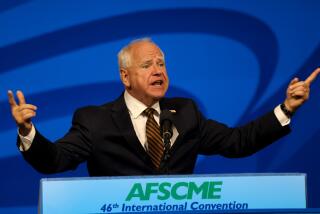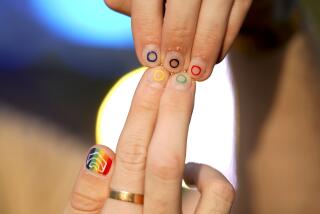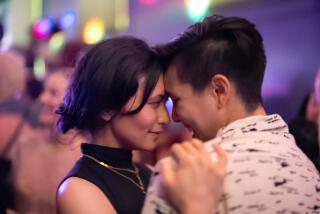‘We Have Arrived’ : Athletes, Activists and Culture Aficionados: What They Have in Common Is New York and Gay Pride
- Share via
NEW YORK — One of the biggest, most spirited families imaginable is about to converge here, clogging the streets in a way that may be historic, celebrating with parties around the clock and booking as many rooms as the hotels can accommodate.
The gay and lesbian throngs are coming.
In the same way that a family reunion might find one group of cousins spending the whole day playing softball, another around a table studying the family tree, and yet another worrying if there’s enough to eat, almost every permutation of gay group is holding its own event June 18-25 to coincide with the Gay Games IV and Cultural Festival and the 25th anniversary of Stonewall, a bar riot that helped spark the modern gay rights movement.
Almost 11,000 people are registered to participate in the games, an Olympic-style event consisting of 31 sports, from same-sex figure skating to ice hockey, badminton to tennis, physique to power-lifting and a marathon of two loops around Manhattan. Anybody can enter the games--gay or straight, athletic or not.
Then, the day after the closing ceremonies at Yankee Stadium, from 300,000 to 1 million people--depending on who’s doing the estimating--are expected for “Stonewall 25,” a march and rally commemorating the 1969 police raid on a Greenwich Village bar that is said to have launched the gay rights movement. Gay pride events across America have been rescheduled so as not to conflict with the New York celebration.
The week will include such events as a conference for the Gay & Lesbian Parents’ Coalition, the National Gay Pilots Assn. convention, a reception for the gay People of Color Caucus, the International Conference of Bisexuality and the International Mr. Deaf Leather Contest.
*
The gay community has reached a predictable point in a community’s maturation: not everybody is interested in everybody else’s activities--particularly the athletes and the activists.
Jonathan Louie, a Los Angeles graphic designer who was born in New York, has invited his whole family to watch him compete in swimming and in-line skating. His parents, who have slowly come to accept his homosexuality, have even asked him to get them tickets for the opening and closing ceremonies.
For Louie, who is HIV positive, swimming with the West Hollywood Aquatics Team has motivated him to stay in shape and left him a great devotee to his mostly gay team, which is sending 100 swimmers to New York.
But the minute the competition ends, Louie is returning to Los Angeles rather than staying for the march and rally commemorating the Stonewall riots.
“It just doesn’t mean something to me in my gut,” says Louie, 39.
Randy Spicochi, head of “Team LA,” a group of 500 athletes, says so much has gone into preparing for the games--from picking team uniform colors to finding accommodations for the athletes--that no one gave much thought to political events.
“We couldn’t care less about Stonewall,” he says. “The reason we’re going is to compete. We’re first and foremost athletes of all abilities and all sports. At most Stonewall will bring us more spectators. Which is great.”
Tom Stoddard, who helped lead the fight against the Pentagon’s policy against homosexuals, has no interest in the Gay Games.
For him, the week’s high point will be a panel he is mediating at the New York City Bar Assn. on the legal aftermath of Stonewall.
Stoddard is completely caught up in the emotions of the 25th anniversary of what he calls “the revolution against the oppression of millions of men and women.”
“I love being 46 years old and doing this work because it has given me a perfect view of all of the modern movement,” says Stoddard, who for years headed the Lambda Legal Defense Fund, a legal rights group for gays. “The sad part of all this is that a lot of colleagues are not around because of illness and death.”
Stoddard sees the anticipated chaos, confusion and complexity of the June events in New York as a perfect commemoration of the birth of a movement that now reflects all of those things in a city that also reflects them.
“We have arrived,” Stoddard says. “We can be diverse.”
*
The first Gay Games were held in a similarly frenetic city, San Francisco, in 1982 and were conceived by Tom Waddell, a doctor and a decathlete in the 1968 Mexico City Olympics. Waddell, who died of AIDS in 1987, had run into so much homophobia as an Olympic athlete that he said he believed it was important for gays to have an opportunity to do their personal best in sports without prejudice.
“In the spirit of Dr. Waddell, the purpose of the games is to break a lot of stereotypes and show that we’re a proud and visible community and that we set records too,” says Jay Hill, executive director of the Gay Games.
But Ric Munoz, an exceptional marathon runner from Los Angeles who is HIV positive, says he has little concern for making political statements through his participation in the games.
Except for one.
Says Munoz: “I only hope my running in the winner’s circle will make someone who is HIV positive think twice about giving up everything and say at least ‘I can go for walks; I can do some swimming; I can do something.’ ”
Just don’t refer to these as the Gay Olympics, Hill cautions.
Even though the Gay Games are held every four years and have all the trappings of such an event--from team uniforms to T-shirts and sponsors--the International Olympic Committee went to court several years ago to make sure the games’ organizers never used the term.
The problems surrounding Gay Games and Stonewall 25 are typical of those at any mega-event. Already, there is a litany of complaints:
Some people are upset that New York’s annual Gay Pride Parade has been supplanted by a more somber march without floats, drag queens, costumes and music. And the route of the march from the United Nations to Central Park has been so long in dispute that at the moment it’s unclear how the masses will get across and up town.
Meanwhile, some athletes are grumbling that locations for certain competitions haven’t been secured and that cultural events accompanying competitions haven’t been tightly organized.
Then there is concern for people coming from abroad.
Games officials anticipate about 3,300 athletes will come from overseas while Stonewall 25 will draw several thousand from other countries. Although the U.S. government approved a 10-day visa waiver for those who have AIDS or are HIV positive--the first such waiver for anything other than a medical conference--it is unclear whether the government will grant political asylum to gays wishing to leave countries where they are persecuted.
And then there’s money.
Organizers of both the games and the march are concerned that they won’t have enough money to run their operations. Games officials have raised $6 million--with Miller Brewing the largest sponsor--while Stonewall 25 coordinators have come up with $2.5 million.
Overall, considering the size of the extravaganza, the complaints from conservative quarters has been relatively marginal.
A New York city school board member, a Bronx minister who heads a Latino clergy group, and a local conservative activist held a news conference last month charging that the games promote homosexuality and that HIV-infected athletes could pose a health risk if they engage in unprotected sex.
The Rev. Ruben Diaz, who is also an appointee to Mayor Rudolph Giuliani’s Civilian Complaint Review Board, says the games “will teach our young adults and children that homosexuality is OK, that it is not immoral or sinful behavior or that this kind of behavior is not biologically dangerous.”
But Giuliani quickly disassociated himself from the minister’s remarks, noting that such comments by Diaz and other critics “contribute to fear and misunderstanding.”
The gay events, after all, are likely to be an incredible boon to the city economy: They’re projected to generate as much as $400 million. And these protests are whispers compared to the bellows of recognition coming from New York’s Establishment. Such pillars of society as the Yale Club, the Museum of the City of New York and the Brooklyn Historical Society are demonstrating approval with exhibits, events, conferences, lectures and panels. Even the New York Public Library is holding a major exhibit in honor of Stonewall 25 from June through September.
New York’s gay community will be offering more entertaining shows. In addition to the usual clubs and restaurants, many party sites such as Roseland, Danceteria, the Palladium and the USS Intrepid--parked in the Hudson River--will be taken over for celebrations.
*
Steve Hanan, a New York actor, says he won’t attend the games nor the noisy dance parties because “I’m too old, the music is too loud and they’re not smoke-free,” but he marvels at the size of the June activities and of the increasing numbers of younger gay men and lesbians who come to these events.
“It’s very inspiring to feel that we are like a transitional generation,” says Hanan, who is 47 and who went to last year’s gay rights march in Washington, D.C.
“I never could have dreamed as a teen-ager to walk hand in hand with the same-sex partner. Now, there are these enormous marches.”
Although the Stonewall riots have become the emblematic event, they were not necessarily as monumental a turning point in radicalizing gays as AIDS has been.
Still, Stonewall has become the moment of gay history.
“The fact that the riot came in 1969 at the end of the ‘60s when so many challenges to authority had been made is critical,” says Martin Duberman, who recently completed a book on the Stonewall riots. “It couldn’t have happened in 1959.”
Or maybe even two weeks earlier.
Part of the reason many people fought back while they were being taken away by police raiding the Stonewall Inn that June 27, 1969, night was that emotions had been running high in gay homes in Greenwich Village.
Judy Garland, a gay icon, had died a few days earlier and her funeral was that day in New York. Many gays identified with her vulnerability and emotionalism.
“Really, there is no one reason for the outburst,” says Duberman about the days of rioting prompted by the raid. “The tension had for so long been building.”
Duberman says the march and the rally--and even the games--are important so that gays don’t lose their history.
“The danger is it will be our 15 minutes and that will be that,” Duberman says. “But I don’t think so because so many people are ‘out’ now. The best that can happen is that people will take the energy back to their local communities and put it into action.”
More to Read
Sign up for Essential California
The most important California stories and recommendations in your inbox every morning.
You may occasionally receive promotional content from the Los Angeles Times.













